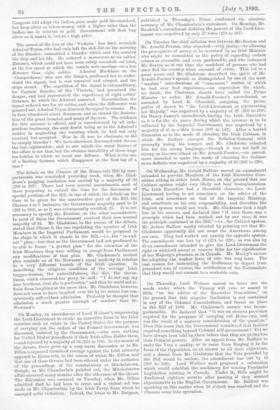On Tuesday the chief collision was between Mr. Sexton and
Mr. Arnold-Forster, who objected,—very justly,—to allowing the prerogative of mercy to be exercised by an Irish Minister who might be committed to the policy of regarding certain crimes as excusable and even pardonable, and who instanced Mr. Sexton as at one time the confidant of persons who had since fled the country when accused of crime. This led to a great scene, and Mr. Gladstone described the spirit of Mr. Arnold-Forster's speech as distinguished by one of the most " wanton " introductions of " venomous " matter of which he had ever had experience,—an expression for which, we think, the Chairman should have called the Prime Minister to order. Mr. Arnold-Forster's amendment, as amended by Lord R. Churchill, assigning the prero- gative of mercy to "the Lord-Lieutenant as representing' her Majesty," was negatived by a majority of 37 (293 to 256). Sir Henry James's amendment, leaving the Irish Executive as it is for the six years during which the revenue is to be collected by the Imperial Government, was negatived by a majority of 45 in a thin house (187 to 142). After a heated discussion as to the mode of choosing the Irish Cabinet, in which Mr. Balfour charged the Solicitor-General with generally losing his temper, and Mr. Gladstone rebuked him for his strong language,—though it was not half so strong as his own attack on Mr. Arnold-Forster,--an amend- ment intended to make the mode of choosing the Cabinet more definite was negatived by a majority of 33 (262 to 2E9).


































 Previous page
Previous page